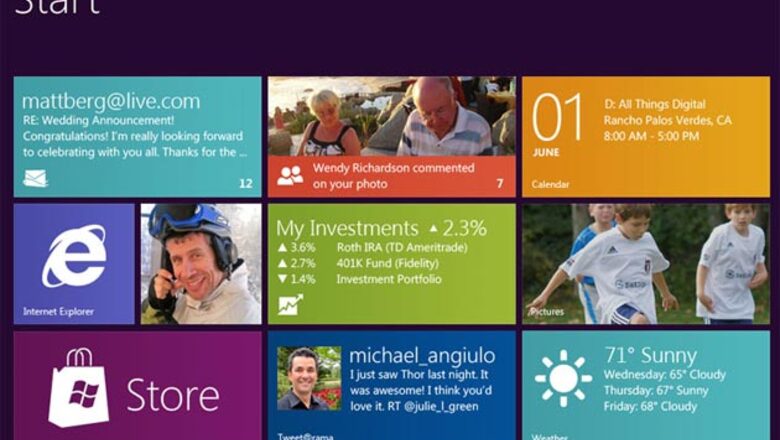
views
San Francisco: The ailing personal computer market is getting weaker, and it's starting to look like it will never fully recover as a new generation of mobile devices reshapes the way people use technology.
The latest evidence of the PC's infirmity emerged Wednesday with the release of two somber reports showing unprecedented declines in the sales of desktop and laptop machines during the first three months of the year.
As if that news wasn't' troubling enough, it appears that a pivotal makeover of Microsoft's ubiquitous Windows operating system seems to have done more harm than good since the software was released last October.
"This is horrific news for PCs," said BGC Financial analyst Colin Gillis. "It's all about mobile computing now. We have definitely reached the tipping point."
First-quarter shipments of PCs fell 14 per cent from the same time last year, according to International Data Corp. That's the deepest quarterly drop since the firm started tracking the industry in 1994. Another research firm, Gartner Inc., pegged the first-quarter decline at 11 per cent.
The deviation stemmed from the firms' slightly different definitions of PCs.
No matter how things parsed, this is clearly the worst shape that the PC market has been in since IBM. released a desktop machine in 1981.
In an attempt to keep the PC relevant, Microsoft released a radical new version of Windows last fall. Windows 8 has a completely new look that's similar to the design of the software running the most popular smartphones and tablet computers. The overhaul requires a relearning process, a leap that many consumers and corporate buyers aren't ready to take.
All signs so far point to Windows 8 being a flop.
"Unfortunately, it seems clear that the Windows 8 launch not only didn't provide a positive boost to the PC market, but appears to have slowed the market," IDC Vice President Bob O'Donnell said.
The newest version of Windows is designed to work well with touch-sensitive screens, but the displays add to the cost of a PC. Together, the changes and higher prices "have made PCs a less attractive alternative to dedicated tablets and other competitive devices," O'Donnell said.
Representatives of Microsoft were not immediately available for comment.
In its tally, IDC excludes tablets, even if they run PC-style software. It also excludes any device that has a detachable keyboard. With the release of Windows 8, PC makers have been reviving their experiments with tablet-laptop hybrids, some of which have detachable keyboards. Consumers are likely to have shifted some of their buying away from traditional laptops and toward these new devices, which means that the total sales decline of Windows-based devices may not be quite as drastic as IDC's numbers suggest.
Microsoft shares fell 63 cents, or 2 per cent, to $29.65 in extended trading, after the release of the report. They had gained 67 cents in regular trading.
Hewlett-Packard, the world's largest maker of PCs, saw a 24 per cent drop in shipments in the first quarter compared with the same period a year ago. The industry's No. 2, China's Lenovo Group, is benefiting from sales to first-time buyers in China and other developing countries. As a result, it held sales steady, alone among the world's top 5 PC makers, according to IDC's figures.
HP shares fell 60 cents, or 2.7 per cent, to $21.72 in extended trading. They had risen 10 cents in regular trading.
Shares of Intel, which makes four out of five PC processors, fell 27 cents, or 1.2 per cent, to $21.99, after rising 51 cents in regular trading.
Gartner noted one bright spot: Businesses are buying more PCs, and account for about half of the market.
In total, IDC put the global PC shipments at 76.3 million in the quarter, while Gartner put the figure at 79.2 million. The shipments are still higher than they were four years ago, during the recession.
Both firms track shipments of PCs from the manufacturer rather than retail sales. Shipments correlate closely with sales. The figures include shipments of Apple's Macs, which account for about 5 percent of the worldwide market.




















Comments
0 comment